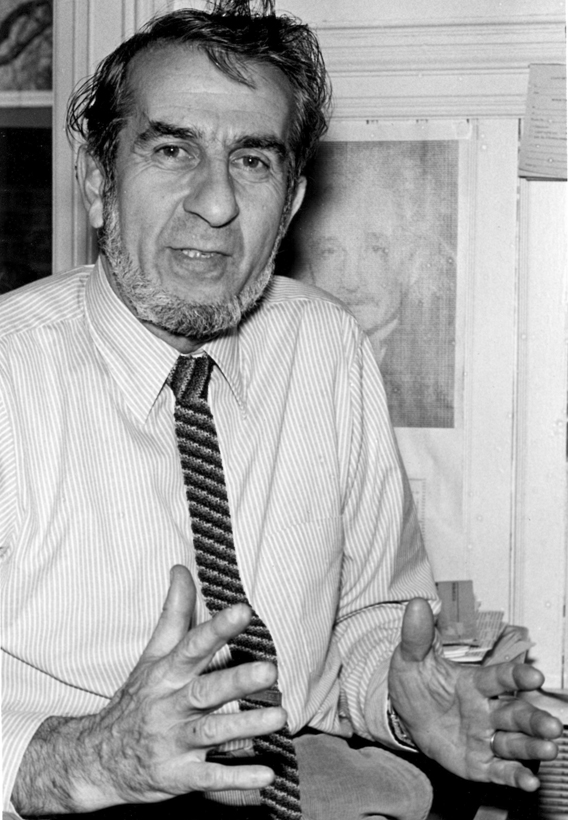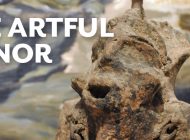 Colleagues called him “T.O.” Students called him “Doctor Schlesinger.” Few knew about the remarkable life experiences that shaped his teaching.
Colleagues called him “T.O.” Students called him “Doctor Schlesinger.” Few knew about the remarkable life experiences that shaped his teaching.
When long-time faculty member and Professor Emeritus Thomas O. Schlesinger died in February, details of an extraordinary life emerged—many of which were news even to his closest former colleagues and students. Schlesinger had arrived at Plymouth State in 1970 with only a few years of university-level teaching behind him. But the life experiences he brought into his history, government, and political science classrooms informed his teaching to a degree that academics alone could match only in theory. Schlesinger remained private about most of those experiences—his approach came from an old school; among students his reputation was that of a serious, stern teacher. “We all knew which professors in the department were soft,” recalled a student from those early days. “Dr. Schlesinger was not one of them.”
But occasionally—in his class on human rights and world order, say, or one he taught on German history—he’d share a personal memory that brought to life the importance of prisoners’ rights or the challenge of creating a foreign policy consistent with a nation’s ideals. He talked about espionage and interrogation in a knowing, almost thrilling, way. His pointed observations came from Nazi Germany, from pivotal World War II battles in Luxembourg and France, from Congressional hearings, from the unstable countries of Latin America and the Middle East—a tinderbox he sensed long before the understanding became widespread. His passion for fairness and social justice seemed, at times, visceral and inseparable from his teaching. It translated.
As it happens, he’d come to that passion not simply from having lived in the wider world, but from having been a participant in some of the major world events of the twentieth century. His life helped shape the education of 25 years of Plymouth students.
Schlesinger escaped Hitler’s persecution in Berlin and fled to Italy and then Switzerland before arriving in the United States in 1940. In 1943, at the age of 18, he enlisted in the US Army and was sent to the Military Intelligence Training Center at Camp Ritchie, Maryland, and became one the “Ritchie Boys”—an elite unit of young, mostly Jewish immigrants from Germany and Austria who were trained in counterintelligence, interrogation, and psychological warfare. He helped break German resistance at the Battle of the Bulge and at Remagen Bridge. He interrogated Nazi officials and camp guards in preparation for the Nuremberg Trials. He fought throughout the Korean War; participated in the Operation UPSHOT-KNOTHOLE atomic test in Nevada in 1953; served as interpreter (in German) for Lt. General William Arnold in creating Austria’s peace treaty in 1955 and then as interpreter (in Italian) for Brig. General John “Iron Mike” Michaelis with the Southern European Task Force in northern Italy, helping establish the US Army’s first overseas missile command. He rose to the rank of major and became a Green Beret instructor at the JFK Special Warfare Center at Fort Bragg.
And he was devoted to learning. He was fluent in four languages, struggled nights and worked overtime to earn a high school diploma, then a bachelor’s degree from the University of Maryland, then a master’s and doctorate from American University in Washington. He began work on his PhD even before finishing his 21-year-active-duty military career.
When he became a college professor at the age of 42, it was not to kick back and tell war stories. At Plymouth State, Schlesinger was passionate about making students more aware of the world. He helped shepherd the University’s Model UN Program. He served as a founding chair of the Sidore Lecture Series, which continues to bring leading thinkers to campus to speak on topics relating to politics, social justice, and current events. He served on the board of the World Affairs Council of New Hampshire and the New Hampshire Civil Liberties Union. He regularly attended conferences and talks on national security, foreign policy, and human rights. Professor Peng-Khuan Chong, a colleague who sometimes accompanied Schlesinger, says, “Even at the conferences he was constantly thinking of his students. Always wondering what he could bring back to the classroom. He’d say to me, ‘Now how can we present this fairly when we go back to teach?’”
“He cared deeply about his students,” says his widow, Patricia Powers Schlesinger. “He was born to teach.”
Schlesinger invited students to his home in New Hampton, to learn more about their lives outside of college. He reached out, in particular, to foreign students, to make them more comfortable in their unfamiliar surroundings. He surprised his advisees at graduation with the gift of a thoughtfully chosen book. He counseled young people to go into the Peace Corps (as his son Peter did), serve in the military (as his daughter Annie, who piloted a Blackhawk medevac helicopter, did), and to be active and engaged citizens. He encouraged them to be life-long learners, and he lived what he preached. He and Pat spent a sabbatical backpacking across Asia and Africa. In retirement, he took an intensive course in Russian in Leningrad before setting off to travel in the country using its native tongue.
In short, Thomas Schlesinger represented the highest ideals of a Plymouth State education: academic excellence, service, civic engagement, global perspective. In part to honor and extend his legacy, and in part to recognize the similar challenge and struggle that today’s students face in affording a formal education, Pat Schlesinger has established an endowed scholarship in her late husband’s name. It is a fitting tribute to a man who devoted nearly his entire life to the cause of understanding our larger world.
In his final days, a nurse at Dartmouth-Hitchcock asked him about his middle name of “Otto,” and—barely able to speak—he gave her a three-minute mini-lecture on the career of Germany’s first chancellor, Otto von Bismarck.
“He was,” notes Pat, “a teacher until the very end.”—Jim Collins
The Dr. Thomas O. Schlesinger Memorial Scholarship in Political Science is the newest of endowed scholarships that honor the memory and legacy of a beloved faculty member. Each year, the fund will provide recognition and financial support to a junior- or senior-level student who is a political science major carrying a minimum 3.0 GPA.
For more information about establishing an endowed scholarship at Plymouth State contact Laure Morris, director of major gifts, at lmorris5@plymouth.edu or (603) 535-2952.
Jim Collins, former editor of Yankee Magazine and author of The Last Best League, is a freelance writer living in Orange, New Hampshire.
Someone Who Had a Profound Influence
In the words of Doctor Schlesinger’s students …
Joe Laturnau ’77
School Renewal Specialist; Hawaii
I had the chance to go into the Peace Corps in Korea in 1977. I wanted to go, because I knew I needed experiences like that in order to become like Tom Schlesinger and the other professors I admired in the Social Science Department. My parents were very opposed and upset. I had a number of conversations with Dr. Schlesinger, and I greatly appreciated his support. With just a few words and a comforting look, he had such a calming effect. I decided to go. I’ve now spent more than 30 years in the Hawaii Department of Education.
I go to trainings/workshops all the time. Frequently a warm-up question will be, “Share a story about your mentor or someone who had a profound influence on your career in education.” I often share that story about Dr. Schlesinger.
Tracy Floyd ’81
Vice President, Health, Financial Services & Technology, Ipsos-Vantis; Maine
Thomas Schlesinger was passionate about his teaching, and this was palpable in his classroom. He had high standards for his students, and this helped me to sharpen the skills I needed in life. To this day I think of the “Schlesinger Strut” — how he determinedly strutted across the front of the classroom to drive home a point.
Evangelia Ifantides ’88
Technology Specialist, Fairfax County Public Schools; Virginia
His was the last political science class I took… and I clearly remember that it was difficult. But it prepared me for the start of my Soviet Studies degree at American University, Dr. Schlesinger’s alma mater.
Richard A. Coutermarsh ’85
President & CEO at InnerLoc, Inc.; Texas
I will be forever grateful to Tom for taking the time to guide me during my time at Plymouth State College, and for sharing his wisdom about the world. One of the first things I did after hearing about Dr. Schlesinger’s death was to go to my study and pull down from my bookshelf the book that he gave to me as a graduation gift, Ike’s Spies, by Stephen E. Ambrose. I remember when I told him that I had narrowed down my choice of careers to either becoming an Army Officer or FBI Agent, he looked at me and said, “Interesting choices, the profession of arms or knocking on doors.” From then on it was go Army!
Tags: Patricia Powers Schlesinger Schlesinger Memorial Scholarship Thomas Schlesinger








